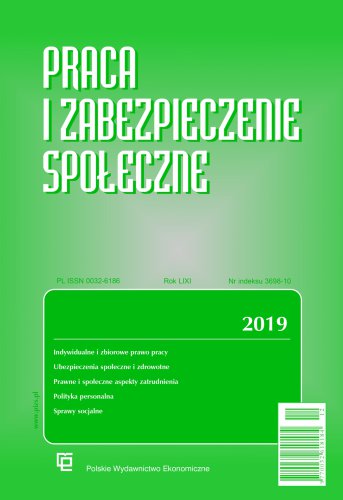This article present status of a temporary agency employee in Polish law in relation to maternity. Temporary agency work is classified as one of the atypical forms of employment which are characterized by a lower standard of employee protection. In principle, a temporary agency worker is subject to the same protective standards as those applicable to employees employed on the basis of a fixed-term contract without the participation of an employment agency. However, some differences can be found in the scope of extending the fixed-term contract of employment until the day of childbirth (Article 177 para. 3 of the Labour Code). This rule applies to female employees who were employed on the basis of a fixedterm contract of employment, which would be terminated after the third month of pregnancy. In Poland, however, this rule did not apply to temporary agency workers until 1 June 2017, when the legislaturę also protected temporary agency workers who have a total of at least 2 months of assignment to perform temporary agency work by a given temporary employment agency on the basis of an employment contract. The Polish legislator decided to introduce protection for pregnant temporary agency workers, as the previous solutions were contradictory to the EU directive on temporary agency work. The current solution is criticized because, as it is pointed out, it is in conflict with the purpose of temporary agency work, which is assumed to be flexible and short-term employment.
Przedmiotem artykułu jest status pracownicy tymczasowej w związku z macierzyństwem. Praca tymczasowa jest zaliczana do nietypowych form zatrudnienia, które charakteryzuje niższy standard ochrony pracownika. W zasadzie pracownica tymczasowa podlega tym samym normom ochronnym, które obowiązują w przypadku pracowników zatrudnianych bez udziału agencji zatrudnienia na podstawie umów terminowych. Chodzi głównie o zakaz wypowiedzenia umowy o pracę w czasie ciąży i macierzyństwa, a także prawo do urlopu macierzyńskiego. Warto jednak zwrócić uwagę, że praca tymczasowa nie gwarantuje w pełni ochrony macierzyństwa. Pewne odrębności można odnaleźć w zakresie przedłużenia terminowej umowy o pracę do dnia porodu (art. 177 § 3 k.p.). Ta zasada obejmuje pracownice, które zostały zatrudnione na podstawie terminowych umów o pracę, które to umowy uległyby rozwiązaniu po upływie trzeciego miesiąca ciąży. W Polsce zasada ta nie miała jednak zastosowania do pracownic tymczasowych do 1 czerwca 2017 r., kiedy to ustawodawca również objął ochroną pracownice tymczasowe, które mają łączny co najmniej 2-miesięczny okres skierowania do wykonywania pracy tymczasowej przez daną agencję pracy tymczasowej na podstawie umowy o pracę. Ustawodawca polski postanowił wprowadzić ochronę pracownicy tymczasowej w ciąży, ponieważ dotychczasowe rozwiązania były sprzeczne z uregulowaniem unijnej dyrektywy w zakresie pracy tymczasowej. Obecne rozwiązanie jest jednak krytykowane, ponieważ — jak się wskazuje — jest sprzeczne z celem pracy tymczasowej, która z założenia ma być zatrudnieniem elastycznym i krótkotrwałym.
Keywords: temporary agency work; maternity; fixed-term contract

